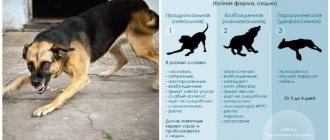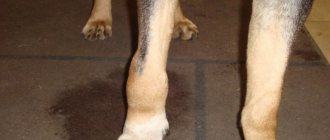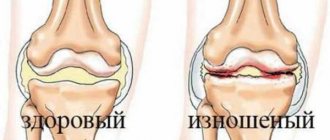What can cause dogs to vomit?
Vomiting of bile contents can occur in isolated cases or systematically. The separated masses acquire a yellow, green tint. They consist of liquid and sometimes contain fragments of undigested food. The owner needs to carefully look at the frequency with which the animal has seizures and why dogs vomit bile.
Isolated cases
In some episodes, vomiting occurs due to eating weeds while walking. In this way, the animal rids itself of hair and other debris in the stomach. This does not affect your well-being.
It happens that a dog swallows grass, causing it to vomit. This suggests that there is an increased amount of bile in the body. In such cases, you should call a doctor. It may be necessary to prescribe choleretic drugs.
Vomiting of bile occurs if a hungry animal is given a large amount of fatty food. This also applies to service dogs who are offered fatty food after a day of work. The release of a significant amount of bile can damage the mucous membrane of the digestive organs and lead to death due to the penetration of bile into the blood.
One-time vomiting of bile is most likely the result of acute poisoning with stale food with artificial additives, pesticides or heavy metal compounds. In this case, the animal is shown to the doctor. The same actions are performed in case of heat stroke. A jump in temperature has a negative effect on the body and leads to a tragic outcome.
Finally, vomiting of bile occurs due to severe stress or a change in diet (when the animal is switched from natural food to dry food). It is especially dangerous when an animal is allowed to try sweets, cocoa products, fried meat or delicacies. They also provoke vomiting in the animal. Confectionery products cause serious poisoning in animals caused by impaired kidney function.
Recurrent vomiting
If frequent episodes of bilious vomiting are found in dogs, the reasons for this are as follows.
- Hepatitis. The animal shows aversion to food and nothing can improve the appetite. The pet's weight loss is often observed.
- Chronic forms of gastritis. With this disease, vomiting appears in the morning. The animal weakens, loses weight, and its coat condition deteriorates significantly. Gastritis also leads to a deterioration in the absorption of vitamins.
- Rejection of the contents of the gallbladder into the stomach due to disruption of its sphincter. For this reason, the development of a perforated ulcer is possible.
- Infestation with parasites. An excessively large number of worms is one of the likely causes of death in dogs.
- Presence of gastric neoplasms. With this pathology, the animal vomits undigested food debris.
- Entry of a foreign body into the stomach. Because of this, vomiting is profuse and repeated.
- Diseases of the pancreas.
- Piroplasmosis. An extremely dangerous disease when a pet can die in a matter of days. Vomiting in a dog due to the development of piroplasmosis at the terminal stage.
- Infectious pathologies: damage by leptospirosis or adenoviruses, plague, enteritis, parainfluenza, rabies. Dog owners need to remember that rabies is a fatal disease: once its earliest symptoms appear, it is impossible to cure the animal.
- In pregnant bitches, vomiting bile is the result of toxicosis.
- Chronic poisoning with pesticides, salts of heavy metals. There is a danger of toxic substances entering the blood and developing general poisoning.
- Diseases of the central nervous system.
- Systematic vomiting occurs when overeating.
- Formation of intestinal obstruction.
A dog is vomiting bile: possible reasons, what to do at home
Owners of four-legged animals get scared when their pets first show signs of illness. Common problems include a dog vomiting bile. It can be of physiological or pathological origin; in the latter case, the animal needs veterinary consultation and therapy.
The essence of the gag reflex and common causes of vomiting
Vomiting in a dog
The gag reflex refers to the protective properties of the body, in which the evacuation of food debris and suspected toxins occurs. Vomiting is an involuntary action, the root causes of its occurrence include:
- food, drug, etc. poisoning;
- helminthiasis;
- allergies and infectious diseases;
- penetration of insects into the lungs;
- stress, overeating;
- overheating in the sun, etc.
Causes of poor condition
Varieties of vomit by color and consistency
The color of vomit helps to roughly determine the reasons for its occurrence.
Dog vomiting is yellow
If a dog is vomiting yellow liquid (orange), then it contains bile. Sources of discomfort are presented:
- chronic gastrointestinal pathologies - gastritis or ulcers;
- cholecystitis;
- viral or infectious hepatitis;
- helminthiasis;
- piroplasmosis;
- a tumor localized near the gallbladder;
- overeating.
Repeated occurrence of vomiting requires a visit to the veterinarian and a full diagnostic examination.
With a pinkish tint
A pink mass indicates the presence of an infectious disease, including trancheobronchitis. Damage to the upper respiratory tract is accompanied by a dry cough and fever. Pathologies pose a particular danger to puppies.
Important! If the contents are bloody with pink streaks, the root cause may be helminthic infestations and infections. Bright scarlet clots raise suspicions of injuries to the nasopharynx, oral cavity, chest or larynx.
With green color
Vegetable shades occur when the contents of the small intestine enter the stomach. The problem is associated with obstruction, helminths, and certain infections. In the summer, green vomit occurs when your pet consumes excessive grass.
Foam type
If your dog is vomiting yellow with white foam, it may be a defensive reaction. An animal may vomit when it is hungry or overeating. Regular repetitions should alert the owner of the four-legged dog - the development of gastrointestinal diseases is possible.
Important! If the dog vomits yellow foam and at the same time suffers from diarrhea, then there is a risk of poisoning or a viral infection.
In addition to loose stools with a distinct odor, the pet may experience a decrease in appetite or refusal to eat, lethargy, weakness, and fever.
Infectious lesion
Causes of bilious vomiting in dogs
There are two large subgroups of sources that cause bile vomiting in dogs.
Physiological or non-hazardous factors
If the reflex is a one-time occurrence and there are no changes in usual behavior, there is no need to worry. This triggered a standard defense mechanism that protects the body from poisoning. Conditions that cause dogs to burp can be caused by:
- overeating - when feeding heavy food in large quantities;
- grass - greens can become a stimulant of the gag reflex and cause a natural cleansing of the gastrointestinal tract;
- seasickness - animals become victims of trips by private car or public transport;
- vaccination - each organism has its own reaction to injected drugs, vomiting is one of the adverse reactions;
- anesthesia - the postoperative period provokes attacks of nausea and vomiting;
- lactation - physiological cleansing of the gastrointestinal tract is observed in some cases in lactating females;
- toxicosis - occurs in pregnant bitches in the early stages;
- diet - switching to industrial food from natural food or purchasing a new form of food;
- long fasting.
These reasons can be determined independently; they do not require contacting a veterinarian. The exception is cases when attacks continue for several days in a row - the pet needs help by taking it to the clinic.
Pathological preconditions
Conditions in which dogs vomit yellow foam may be associated with impaired functionality of internal organs. In addition to nausea and gastrointestinal dysfunction, the animal may experience apathy, loss of appetite (with complete or partial refusal to eat), and fever.
Why does my dog's stomach growl, diarrhea, cough and fever appear? Sources include:
- diseases of viral-bacterial origin;
- chronic pathologies of the digestive tract of any stage and severity;
- allergies, cancer;
- injuries of the gastrointestinal tract, larynx, nasopharynx, lungs;
- poisoning with toxic substances and foreign objects entering the respiratory tract;
- CNS lesions;
- diseases of the cardiovascular and respiratory systems, kidneys, and liver.
Important! If flatulence appears, accompanied by rumbling in the stomach, diarrhea, cough, or high temperature, the dog should be urgently taken to a veterinary clinic. Non-pathological vomiting
What does this symptom mean?
Owners of four-legged animals need to learn to distinguish regurgitation from the gag reflex. The animal can vomit once; the excreted masses do not have a disgusting odor and do not include particles of blood or mucus. They contain undigested food residues.
The pathological type of vomiting is manifested by a pungent odor and is associated with cleansing not only the stomach, but also the intestines. The body calls it to remove toxic or solid substances.
Emergency help at home
When symptoms appear, in which the dog vomits yellow liquid along with foam, the owner must provide first aid to the four-legged dog. The procedure is performed until an accurate diagnosis is established and does not cause harm to health. Proceeds according to the following algorithm:
- The owner should not show his own excitement - from the moment of the attack he will have to monitor the pet’s condition, remembering all the clinical signs of ill health.
- The dog must be reassured - he must be sure of his safety. You shouldn’t speak in a raised voice, panic, or think about what to do with him.
- The animal is stopped feeding and water is given in unlimited quantities. To suppress repeated vomiting, you can offer him ice cubes.
Keep the pet hungry until the reasons for the deviation are determined. The zero table lasts 24 hours, he must have free access to clean water. If the issue is related to physiological manifestations, then for the next two days the dog is fed dietary food, and later returns to the usual menu.
Important! If you suspect a pathological origin of vomiting in a Spitz in the morning, you should not engage in amateur activities and give medications. How to give water to a sick animal
Diagnosis of bilious vomiting in dogs
The veterinary clinic conducts a full diagnostic examination. After treatment, the doctor does a general examination of the pet, measuring heart rate, temperature, and determining the condition of the mucous membranes.
The veterinarian makes a preliminary diagnosis and sends it for additional research:
- clinical urine and blood tests (fasting);
- X-ray and endoscopic examinations;
- Ultrasound of the abdominal cavity.
Important! After passing all the tests and studies, the specialist makes a final diagnosis and prescribes treatment in accordance with the complexity of the disease and the current condition. Ultrasound examination
When you need to see a doctor urgently
The physiological origin of the ailment does not require the intervention of the owner; the deviation goes away on its own. A visit to the veterinary clinic is recommended if you have the following symptoms:
- if your pet continues to burp regularly;
- the appearance of streaks of blood, pus, mucus or their non-standard color in the vomit;
- frequent urination;
- change in color of the mucous membranes of the oral cavity - yellowness or whitish coating;
- weakness, lethargy, apathy;
- fever, cramps, soreness and bloating.
Important! Serious clinical manifestations of the pathology include sudden weight loss and complete refusal to eat. Visit the veterinarian
Preventive measures
Prevention of the development of non-standard conditions with vomiting and other signs is carried out in accordance with the rules.
The owner must:
- carry out feeding according to the recommendations of doctors and feed manufacturers - in moderation, without overfeeding or prolonged fasting;
- do not forget about treatment against parasites (fleas, helminths, ticks) and vaccination;
- eliminate attempts to get food from street trash cans or home buckets;
- give medications only as prescribed by a veterinarian;
- remove all potentially dangerous substances and objects from public access;
- When traveling, use special anti-motion sickness products.
Many four-legged animals suffer from eating disorders due to their owners' attempts to give them stale food or feed them cheap, inferior food. Mixing industrial and natural diets also becomes the primary source of gastrointestinal irritation.
In situations where your Yorkie or Pekingese is vomiting bile, there is no need to panic. It is necessary to try to determine the root cause of the malaise and remove all suggestive factors from the animal’s access. In other cases, it is better to contact a veterinarian and treat it.
Source: https://glorypets.ru/sobaki/zabolevaniya-sobak/sobaku-rvet-zhelchyu
Symptoms of vomiting
Nausea occurs before the release of intestinal contents. The main sign is that the dog constantly licks its face. When a dog is nauseous, he salivates and refuses to drink water. Periodically, the animal belches loudly, and when auscultated, a rumbling sound is detected in the stomach.
Vomiting of bile in a dog is combined with such symptoms.
- Constant intermittent vomiting. Then an admixture of bile is detected in the vomit.
- Excess of gastric contents in the morning or at night. The animal refuses to eat.
- When a dog vomits, it whines or howls in pain.
- The animal often tenses, its gaze is directed at one point. Due to the specific posture and movements during nausea, it seems that he is about to vomit.
- The dog is developing signs of exhaustion. His weight decreases, his eyes become sunken, his mucous membranes turn pale.
And also vomiting bile is combined with an unpleasant odor from the mouth. One of the diseases in which the mouth stinks strongly (the smell resembles ammonia or urine) is kidney failure. With diseases of the gums, teeth, and stomatitis, a putrid odor is felt.
If the liver is damaged, the dog does not eat anything and regurgitates. Older animals develop liver failure, cholecystitis, and jaundice.
Color, consistency and contents of vomit
Vomiting is not always associated with food intake. It can be observed on an empty stomach, and several hours after eating.
On an empty stomach, a dog vomits due to inflammatory pathologies of the gastrointestinal tract or renal failure. Vomiting immediately after eating may indicate a foreign body, stomach/esophageal tumors, esophageal diverticulum, or reflux esophagitis. Vomiting of undigested food a few hours after eating most often indicates gastric atony.
If your dog's vomit is yellow (or green), it means there is a problem with the liver or the animal is suffering from an intestinal obstruction below the junction of the bile duct. Vomiting of bile is often observed after the stomach has already been completely emptied, and its antiperistaltic contractions do not stop, and bile from the duodenum is thrown into the stomach. Debilitating frequent vomiting of yellow foam in a dog is one of the indicative symptoms of such a dangerous disease as viral enteritis.
Vomiting blood is an extremely dangerous condition, indicating the development of gastrointestinal bleeding; immediate veterinary attention is required.
Treatment of vomiting is treatment of the pathology that causes it. In this case, it is important to quickly determine the cause, which will help prescribe effective therapy, which directly affects the fastest recovery.
Why does a dog vomit bile?
Such vomiting occurs when food entering the stomach causes irritation of the mucous membrane. What triggers the gag reflex? This reaction is possible in such cases.
- Animals eating grass.
- Consumption of low-quality food if it contains components of artificial origin. The same applies to cases of consumption of expired food.
- Prolonged fasting.
- Poisoning.
- Stomach ulcer.
- Liver damage.
- Weakening of the body.
- Infestation with parasites.
Symptoms and types
In general, you don’t need to deal with the symptoms for a long time: if a dog vomits bile in the mornings and evenings, then the clinical signs are already obvious.
But to make it easier for the veterinarian to subsequently determine what exactly caused this pathology, owners need to pay attention to the following:
- Chronic intermittent vomiting containing bile.
- As we said, it happens in the morning or late in the evening/at night . At the same time, the dog refuses to eat.
- Gastrointestinal discomfort , which manifests itself in the dog’s inappropriate behavior: it whines, growls, and may even howl in pain.
- Nausea : the dog tenses from time to time, looks “somewhere into the distance”, while the animal grunts, due to specific movements it seems that he is about to vomit.
- Very often there is diarrhea caused by a serious disruption of the digestive process.
- Since in severe cases the dog does not eat anything , it quickly develops symptoms of exhaustion: weight loss, sunken eyes, pallor of all visible mucous membranes. The wool becomes thin and brittle.
What are the causes of this pathology? They are quite varied:
- Severe degree of helminthic infestation. Parasites produce such a quantity of toxins that one should not be surprised at vomiting - this is the body’s natural reaction to poisoning. If your dog is vomiting bile every day, has a constantly swollen belly and general signs of exhaustion (protruding ribs, emaciation), then you need to take him to the vet immediately.
- Diseases that cause gastritis or inflammation of the intestines , disrupting the motility of the digestive tract. For example, if a dog vomits bile and blood, this may well be a sign of cancer in the small intestine.
- Some dogs vomit when given food or water on an empty stomach. As a rule, this phenomenon does not pose a health hazard, but the animal should be switched to a feeding regime where food is given frequently, but in small portions.
- Do not forget about “banal” cases of poisoning. By the way, if a dog vomits bile with white foam, this may just indicate that the pet is using something toxic, including household chemicals.
- Finally, dogs also suffer from gastritis and stomach ulcers. A person who has acute gastritis may also vomit from drinking a glass of water on an empty stomach.
If you notice a pet’s “passion” for eating grass (and after this the animal is guaranteed to vomit), then know that in this way he gets rid of the “garbage” accumulated in the stomach. It wouldn't hurt to take him to the vet.
How to give first aid
If you find bile impurities in the vomit, monitor the dog’s condition. If, after an occasional episode of vomiting, the dog feels well and asks to go for a walk, then do not worry, but continue to monitor the condition of the four-legged dog.
If it becomes noticeable that your dog has no appetite or has lost its playfulness, then show the animal to a doctor. Before visiting the veterinarian, you can give your dog Smecta. With piroplasmosis and gastritis, a person cannot help an animal on his own: the veterinarian prescribes special medications that are taken according to a strict regimen. If the dog refuses to eat, there is no need to force feed him.
The animal is injected intramuscularly with No-shpu or Cerucal. They eliminate the urge to vomit. At this stage, give your pet only water. To prevent the development of dehydration, solutions of Regidron or Hydrolyte are prepared. They need to be given in small portions.
Monitor the animal's body temperature. It should be between 37.5 and 39 degrees. When vomiting is accompanied by diarrhea, give the dog Enterosgel.
When you need to see a doctor urgently
If vomiting bile does not go away within three days, you should contact your veterinarian. This should also be done if the following alarming symptoms appear:
- the animal hides from the light and avoids noise (this is one of the signs of distemper);
- an admixture of blood appears in the vomit;
- the dog is lethargic and is constantly in the same place;
- symptoms of dehydration appeared;
- The dog started having convulsions and shortness of breath.
Dog vomits bile
Vomiting every morning
Dear Sirs! Please tell me what could be the matter? The dog vomits bile every morning. I feed him dry food and have not noticed any external signs of health problems in the dog. Veterinarians cannot say anything intelligible.
- did you take a blood test? How long ago did you start vomiting? what age is the dog?
Vomiting in a dog: what to do if a dog vomits after eating, causes, treatment
what food do you feed? Was there anything new in the diet? What tests were done at the veterinarian?
- ...my opinion is an ultrasound of internal organs...including (most importantly) the liver and gall bladder...if a person did this, I would raise the question of cholecystitis.
- I would assume that the dog is either heavily infected with helminths, or his liver is suffering from the food you give him. Give an anthelmintic and change the food. It's better to put your dog on a diet. Plus medications for the liver (it’s better to ask your doctor). I would give Karsil.
- Change food and provide clean water. Mine even vomited because of boiled tap water. I had to buy clean water for him until I installed a filter..
- Sergey. I would like to clearly understand what is meant by the word “vomiting”. There may be a fact that is present in one of my dogs.
Almost every morning one of the dogs does not vomit, but rather regurgitates some (small) amount of bile and a few undigested pieces of dead grass. Both dogs crunch on dead wood stems during walks, including evening walks.
Moreover, in terms of the number and size of the stems they gnaw, they eat enough of them.
After a walk, the dogs eat a portion of food at night.
Well, in the morning the dog does not regurgitate the food, which means it is all digested, but he regurgitates a little bile and several small fragments of stems. As I understand it, this kind of vomiting is not such in the human understanding, it is rather the regurgitation of stomach contents possible in a dog.
- Quote:
Message from kkk2005 (Alexander Gennadievich)
As I understand it, this kind of vomiting is not such in the human understanding, it is rather the regurgitation of stomach contents possible in a dog.
https://www.youtube.com/watch?v=ul46Y5wYbKg
I see this sometimes in mine. Because before you know it, the fool will gnaw something in the evening (for example, steal a piece of paper and make a mess of it), or “kill” another dog’s toy, swallow some small scrap, and in the morning he may vomit. This is a small amount of bile with something inedible from the point of view of a dog's stomach. And before the walk. Not criminal.
- Digestion in a dog works like this: it swallows pieces and all this is processed in the stomach to a liquid state, when the contents of the stomach become liquid, the outlet from the stomach opens and the food mass goes further into the intestines and is already digested there.
Solid remains of bones and indigestible objects remain in the stomach and are removed during vomiting. The dog literally arranges a direct connection between the stomach and the environment, they have this from wolves, those wolf cubs carry prey in the stomach and regurgitate. Dogs often eat dry grass to cleanse their stomach later.
Therefore, giving minced meat to small puppies is of little use; it immediately passes into the intestines without being processed in the stomach and is therefore less digestible - the meat given in pieces is processed in full. Those. In itself, vomiting in dogs is not scary, but every day in the morning with an admixture of bile - it suggests an unhealthy liver.
An ultrasound of the liver and a biochemical blood test will not hurt. Try deworming and changing food.
- Try giving a choleretic infusion of herbs half an hour before meals. The herb is sold at any pharmacy.
- — I feed the dog dry food — Pronature 26 — The male is five years old. I raised him from a puppy and his liver was always unwell: he vomited frequently and his liver was very bad. I treated him long and hard. It somehow went away with age, but sometimes it happens when he vomits bile in the morning for several days in a row.
— In addition to the food, he gave apple cores and skins — He did not take a blood test. — I did an ultrasound with the same symptoms a year ago (then it went away on its own), the ultrasound didn’t show anything. Then the veterinarians said: “I ate something, it will go away on its own. If it doesn’t go away, come and we’ll treat you.” — I chased worms in the fall.
Actually, everything happened as Alexander Gennadievich described.
In the morning, the dog regurgitates a certain amount of bile without food fragments.
- then work on the dog's liver. First of all, change the food. It’s better to switch to natural food - porridge cooked in water, with a minimum of boiled meat. Find out what else you can do while dieting.
Plus medications for the liver.
- I once fed him natural food. If he vomits sometimes with dry food, then with natural food he vomits strictly every other time. Moreover, not with bile, but with food. What liver medications can he be given?
- Sergey, I have a straight male who eats it, but there is a similar problem, some of what he eats is immediately regurgitated. I reduce the portion and the problem disappears by itself.
:er: And about bile, yes, sometimes they regurgitate, both of them. But not every day. The tests are all normal. I deworm once a year, before the rabies vaccination. Therefore, somehow they didn’t bother about it.
I agree with Alexander Gennadievich, therefore I will not repeat myself.
- I would give Karsil. 2 times a day for a month. About other drugs for veterinary medicine.
What did you give from natural sources?
- Quote:
What liver medications can he be given?
...liver liver bubble bubble...various drugs. Do an ultrasound... they will see cholecystitis right away, they will also look at the structure of the liver... if it vomits all over you, then you need to look for the cause... this is clearly not the norm.
- Since he always had problems with his liver, he needs to be given hepatoprotectors for prevention. as written above, you can give Karsil. Take a clinical blood test and blood biochemistry and then consult a doctor. You need to see what’s going on with your liver parameters.
It is not possible to make a diagnosis based on clinical signs alone; it must be made comprehensively.
- Quote:
Message from Dok (Semyon)
Do an ultrasound... they will see cholecystitis right away, and they will also look at the structure of the liver.
forwarder63 (Sergey)
, there is one in the city on Zhernovskaya, 46 vet, ultrasound does excellent. Make an appointment only with her - like Ryabinina. She will also give recommendations for treatment, just talk to her. You don’t have to go to other places for an ultrasound ((
- maybe see a doctor?
otherwise they can give a lot of advice...
- It won't be any worse from Karsil. So everyone says that it is necessary to comprehensively examine the dog. And then he makes a diagnosis.
- Agata (Vera)
,What did you give from natural sources?
I do not remember. That was a long time ago. All sorts of porridges in meat broth, crumbled boiled meat, fish, tripe (not boiled) into it
Source: https://dolphin-school.ru/sobaku-rvet-zhelchju/
Diagnostic features
You can determine the cause of vomiting with bile in a dog using the following diagnostic measures.
- Determination of parasites in feces.
- Blood collection and testing.
- The veterinarian will prescribe a urine test for the animal to determine the functioning of the kidneys and possible abnormalities in the functioning of other organs.
- Biochemical analysis allows you to assess the condition of internal organs. He will give an accurate answer to the question of whether there is a violation of the liver and pancreas.
- X-ray of the abdominal organs makes it possible to determine the presence of foreign objects in the stomach and intestines. An x-ray is done with a barium mixture: it allows you to detect possible intestinal volvulus or obstruction.
- PCR diagnoses infection of the gastrointestinal tract.
- Ultrasound examination of the abdominal organs is necessary to assess the condition of the stomach, liver, and kidneys.
Emergency help at home
Depending on the cause of vomiting and the age of the dog, the dog is kept hungry for some time (maximum - a day). Then the food is resumed: the dog should be fed frequently and in small portions. If vomiting does not appear within three to four days, then the pet is transferred to everyday food.
Cholestasis in dogs - what is it?
Cholestasis in dogs is a blockage of the bile duct, as a consequence of a decrease in the concentration of bile in the intestines and its entry into the blood. The bile ducts are normally open to allow a constant flow of bile into the duodenum during the passage of food. Bile helps foods be digested, absorbed and processed into feces. Stagnation of bile in a dog can cause a serious condition in which the entire digestive function is disrupted.
Gallbladder congestion can occur spontaneously in dogs of any breed. But more often than others, Scottish Shepherds and Schnauzers are susceptible to this disease. Therefore, any sign of pathology of the liver or gall bladder should cause special concern in their owners and increase their attentiveness.
Treatment
In case of intense vomiting, symptomatic treatment is carried out until test results are obtained. It is aimed at stopping the evacuation of stomach contents to the outside, restoring normal water balance and strengthening the body. Antiperistalsis must be suppressed urgently, otherwise the dog will die from dehydration and starvation. For this purpose, taking Metoclopramide (Cerucal) subcutaneously is indicated. Tablets are ineffective in this case.
Restoring lost fluid when a dog vomits is done by drip. Electrolyte solutions are introduced in the same way.
You can ensure the normal functioning of the body by:
- No-shpy and Papaverina;
- Sulfocamphocaine (for heart support);
- Vikasol (to stop bleeding);
- vitamin products;
- medications to restore the balance of intestinal microorganisms.
Usually the animal tolerates treatment well. It is carried out as long as the doctor prescribed. In some diseases it is long lasting. Its recovery depends on how to treat your four-legged pet.
Drinking and eating regime
Do not try to get rid of vomiting: it helps the animal remove toxic substances. Vomiting is also a signal that a disease is developing in the body. When vomiting, the pet is provided with a comfortable position.
It is extremely important to ensure that the animal has water: due to the removal of stomach contents, the concentration of fluid in the tissues decreases, which contributes to dehydration. The dog should be given decoctions of medicinal plants.
The peculiarities of the starvation diet are that the four-legged animal is not fed for the first day, but is given water. And the next day it is allowed to include broth and food for weakened dogs in the diet. Herbal decoctions are allowed to be given by force. Normal nutrition is then resumed. If the condition improves after vomiting, the animal is offered boiled chicken, eggs, or steamed fish.
Prevention
To prevent diseases that lead to vomiting bile in a dog, you should:
- provide the animal with high-quality feed or natural food without preservatives and antibiotics;
- follow a diet, avoid overfeeding and prolonged fasting;
- always provide the animal with access to clean drinking water and prevent dehydration;
- make sure that the dog does not eat foreign objects;
- protect your pet’s access to toxic substances;
- vaccinate the animal, remove worms from its body;
- If necessary, carry out medical examination of the dog.
Modern diagnostics make it possible to timely detect serious pathology and begin treatment.
Vomiting in dogs can be natural and associated with pathological processes in the body. When sick, the dog often refuses food, becomes exhausted, and his stool changes. This vomiting lasts for a long time and aggravates the pet’s health condition. First aid for natural vomiting is to take antipyretic and antispasmodic drugs. The dog must be provided with constant access to clean water. As soon as vomiting occurs, you should stop feeding for a while.
What to do if your dog is vomiting bile
The only correct thing to do if your dog is vomiting bile is to take him to the doctor.
A common mistake many breeders make is that they often neglect medical help, believing that they themselves are able to cure their pet. Fans of veterinary forums on the Internet and folk remedies often only ruin their pets from ignorance of the true cause of vomiting.
If you value the life of your dog, you should not turn into a home doctor and subject your dog to questionable self-medication. In our clinic, the best veterinarians are waiting for your pet, ready not only to diagnose and prescribe treatment, but also to answer any of your questions regarding the animal. Take care of the health of your pets and trust their treatment only to professionals!
Prices for appointments in our network of veterinary clinics
| Name of veterinary services | Unit | Price, rub |
| ⭐ Initial appointment | 1 animal | 400 |
| ⭐ Repeated appointment | 1 animal | 200 |
| Primary reception of ornamental, exotic animals, birds and reptiles | 1 animal | 1000 |
| Consultation without an animal | — | 500 |
| Consultation with a doctor based on test results | 1 PC. | 400 |











